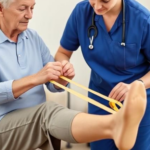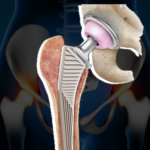
What is Hip Pain?
Hip pain refers to discomfort or aching sensations in the hip joint area, which is where the thigh bone (femur) connects to the pelvis. It can be caused by various factors such as injuries, overuse, arthritis, bursitis, tendinitis, muscle strains, hip fractures or underlying medical conditions. Hip pain can range from mild to severe and may affect mobility and daily activities. Individuals of all ages can experience hip pain, which often hampers mobility and interferes with daily activities.
Signs and Symptoms Associated with Hip Pain
When experiencing hip pain, several signs and symptoms may manifest, indicating discomfort in the hip joint area. These can vary in intensity and duration depending on the underlying cause. Common symptoms include:
- Pain- Hip pain can range from a dull ache to sharp, stabbing sensations. The pain may be localized in the hip joint or radiate to the buttocks, groin or thigh.
- Stiffness- Individuals with hip pain often experience stiffness in the hip joint, making it challenging to move or perform activities that require hip mobility.
- Limited range of motion-The hip may have reduced flexibility, leading to difficulty in performing movements such as bending, squatting or walking.
- Swelling and inflammation- Inflammation in the hip joint can cause swelling, leading to visible or palpable enlargement in the area.
- Clicking or popping- Some people may notice clicking or popping sounds in the hip joint during movement, which can accompany or precede pain.
- Limping-To alleviate pain, individuals may develop a limp or favor one leg while walking or engaging in physical activities.
- Muscle weakness- Hip pain can weaken the muscles surrounding the hip joint, affecting balance and stability.
What causes hip pain?
Osteoarthritis- It is a degenerative joint disease that occurs when the protective cartilage in the joints, including the hip, gradually wears down, leading to pain, stiffness and reduced mobility.
Rheumatoid arthritis-It is an autoimmune disorder that triggers inflammation in the joints, including the hip joint. It leads to pain, swelling and restricted movement in the hip.
Hip impingement- Hip impingement, or femoroacetabular impingement (FAI), is a condition where abnormal contact between the hip joint’s ball and socket causes pain and restricted mobility.
Hip fractures- These refer to a break or crack in the upper part of the femur (thigh bone), near the hip joint. They often result from falls, accidents or weakened bones, causing severe pain, immobility and difficulty bearing weight on the affected leg.
Strains or sprains- Strains or Sprains in the hip occur when the muscles, tendons, or ligaments in the hip joint are stretched or torn. They can be caused by sudden movements, overexertion or trauma, resulting in pain, swelling and limited mobility in the hip area.
Infection or inflammation- Infection in the hip can cause pain and discomfort. These conditions may arise due to bacterial or viral infections, as well as inflammatory disorders, leading to swelling, redness, warmth and restricted movement in the hip joint.
Bursitis-It is the inflammation of the bursae, small fluid-filled sacs that cushion the joints. In the hip, bursitis can cause pain, tenderness, swelling and limited mobility. It is often triggered by repetitive movements, overuse or direct trauma to the hip area.
Tendinitis- It refers to the inflammation of a tendon, the thick fibrous cord that attaches muscle to bone. In the hip, tendinitis can cause pain, tenderness and stiffness. It is commonly caused by repetitive activities or overuse of the hip joint, leading to irritation and inflammation of the tendons.
What methods are used to diagnose hip pain?
To diagnose hip pain, healthcare professionals utilize various techniques to assess the underlying causes and provide an accurate diagnosis. These methods may include:
- Medical history-The doctor will inquire about the patient’s symptoms, the duration and intensity of the pain, any previous injuries or medical conditions and relevant lifestyle factors.
- Physical examination- The healthcare provider will conduct a thorough examination of the hip joint, assessing for signs of swelling, tenderness, range of motion and any abnormalities in the surrounding muscles and bones.
- Blood tests- In certain cases, blood tests may be ordered to identify markers of inflammation or to rule out underlying medical conditions such as rheumatoid arthritis or infections.
- Diagnostic injections- In some instances, diagnostic injections of local anesthetics or anti-inflammatory medications may be administered to confirm the source of pain. If the pain significantly decreases or resolves after the injection, it can help pinpoint the specific area causing the discomfort.
The diagnosis of hip pain involves several diagnostic techniques:
- X-rays: Provides images of the bones to identify fractures, arthritis or structural problems.
- Magnetic Resonance Imaging (MRI): Uses magnets and radio waves to create detailed images of soft tissues, helping evaluate injuries, tears or abnormalities in muscles, tendons, ligaments and cartilage.
- CT scan: Combines X-rays and computer technology to produce cross-sectional images, allowing clear views of bones and detection of fractures or bone abnormalities.
- Ultrasound: Uses sound waves to generate real-time images of the hip joint, commonly used to assess soft tissue structures like tendons and bursae.
Treatment options for hip pain in PCMC, Pune, provided by Dr. Saurabh Giri-
- Medication- Dr Giri may prescribe pain-relieving medications, anti-inflammatory drugs or corticosteroid injections to alleviate pain and reduce inflammation in the hip joint.
- Physical Therapy- Targeted exercises and physical therapy techniques can help improve hip strength, flexibility and overall function. Dr Giri collaborates with skilled physical therapists to develop personalized rehabilitation programs tailored to your needs.
- Minimally Invasive Procedures-Dr Saurabh Giri specializes in minimally invasive surgical techniques, such as arthroscopy or joint injections, that offer reduced pain, faster recovery and minimal scarring. These procedures may include arthroscopy, hip resurfacing or hip joint replacement.
- Hip replacement surgery-If conservative treatments are ineffective or if the hip condition requires surgical intervention, Dr Giri is skilled in performing Hip Replacement Surgery in PCMC, Pune. This involves replacing the damaged joint with an artificial hip joint.
What sets Dr Saurabh Giri apart for hip pain treatment in PCMC, Pune?
Dr Saurabh Giri stands out for hip pain treatment in PCMC, Pune due to several factors-
- Dr. Saurabh Giri offers extensive expertise and experience in diagnosing and treating diverse hip conditions, providing accurate assessments and tailored treatment plans.
- Dr. Saurabh Giri specializes in hip pain management, staying updated with the latest advancements and techniques for optimal patient care.
- Dr Saurabh Giri adopts a comprehensive approach to hip pain treatment, addressing the condition’s severity, patient lifestyle and preferences, providing holistic care that targets both symptoms and underlying causes.
Book An Appointment
To schedule an appointment, please visit the website https://www.kneereplacementsurgeonpune.com/ and book an appointment with Dr Saurabh Giri for hip pain treatment in PCMC, Pune.




